August 29, 2023
For many months now, Vladimir Putin has faced the dilemma of how to rustle up enough warm bodies for his invasion of Ukraine without exposing too much of the Russian population to the horrors of war. One way that the Kremlin has tried to solve this problem? Poach the neighbors instead!
Russia has been recruiting fighters from the neighboring former Soviet republics of Central Asia — Kazakhstan, Kyrgyzstan, and Uzbekistan, in particular. None of these countries are happy about it.
In late June, officials in northern Kazakhstan, a region home to a sizable ethnic Russian population, flagged efforts to recruit mercenaries for the Kremlin’s war effort, as well as to stoke separatist sentiment against the Kazakh government. The Kazakhs have also proposed banning any distribution of goods bearing the “V” and “Z” symbols, which in Russia signal support for the invasion of Ukraine.
But there’s a much larger prize for the Kremlin’s drill sergeants: the millions of Central Asian migrants who work menial jobs inside Russia. Moscow has promised them regular salaries and a fast track to Russian citizenship — a big deal for migrant workers — in exchange for signing contracts with the Russian army.
It’s not known how many have accepted that bargain, but earlier this year, Kyrgyzstan sentenced a Kyrgyz man to 10 years in prison for joining the Russian army while he was working in Moscow. According to prosecutors, the Russian army paid him 180,000 rubles (about $1,900) a month, triple the average earnings of a migrant worker in Moscow. Earlier this month, Kyrgyzstan arrested another man who had been recruited by Wagner Group while serving time in a Russian prison.
Prominent Russian lawmakers have lashed out at Central Asian countries for prosecuting their own citizens on these charges, but joining a foreign army is, in fact, a crime in Kazakhstan, Kyrgyzstan, and Uzbekistan (as it is in Russia too, ironically enough).
Tensions over the Kremlin’s recruitment efforts reflect broader cleavages between Central Asian countries and Russia over the invasion of Ukraine. While they are still firmly within Russia’s economic, security, and cultural orbit, they’ve sought to distance themselves from the Kremlin’s neo-imperial adventures. Read more about that here. And for our look at the foreign fighters helping Ukraine, see here.
More For You
- YouTube
Putin can't stop won't stop. #PUPPETREGIME
Most Popular
We’re moving toward a world where roads don’t just move traffic — they enable services and transactions. Mastercard is working with Volvo and the North Carolina Turnpike Authority on a pilot that explores in-vehicle toll payments without transponders, signaling how V2X connectivity can make infrastructure a platform for data and payments. This future of connected transportation aims to make travel safer, smoother and smarter. Read the full article here.
Bad Bunny during the Super Bowl LX halftime show press conference at Moscone Center.
Kirby Lee-Imagn Images
100 million: The number of people expected to watch the Super Bowl halftime performance with Bad Bunny, the Puerto Rican superstar and newly minted Album of the Year winner at the Grammys.
Alysa Liu of Team USA during Women Single Skating Short Program team event at the Winter Olympic Games in Milano Cortina, Italy, on February 6, 2026.
Raniero Corbelletti/AFLO
Brazilian skiers, American ICE agents, Israeli bobsledders – this is just a smattering of the fascinating characters that will be present at this year’s Winter Olympics. Yet the focus will be a different country, one that isn’t formally competing: Russia.
© 2025 GZERO Media. All Rights Reserved | A Eurasia Group media company.
